Introduction: In this article—to commemorate the fact that this week marks the 149th anniversary of the assassination of President Abraham Lincoln—Scott Phillips searches old newspapers to see how this traumatic news was reported to our ancestors in the nation’s newspapers. Scott is a genealogical historian and owner of Onward To Our Past® genealogy services.
The American Civil War effectively ended with the surrender of Confederate General Robert E. Lee to Union General Ulysses S. Grant at Appomattox Court House, Virginia, on 9 April 1865 (see 149th Anniversary: Civil War Ends with Lee’s Surrender to Grant). Although the last battle of the Civil War was not fought until 13 May 1865, it seemed in mid-April of 1865 that America’s long internal struggle was finally over.
Then, just five days after General Lee’s surrender, tragedy struck the evening of 14 April 1865 when President Abraham Lincoln was shot by Southern sympathizer John Wilkes Booth while watching the popular play Our American Cousin at Ford’s Theatre in the nation’s capital. The President died the next morning from his wounds at the nearby Petersen House located at 453 10th St., Washington, D.C.
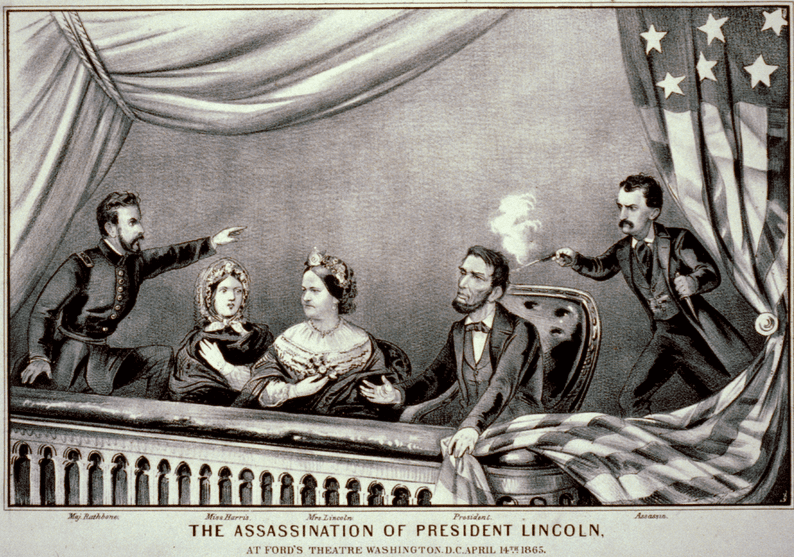
This traumatic news gripped the nation back then, and as genealogists and family historians it is interesting to think about how this news was reported to the public, and to wonder what its effects on our families and ancestors might have been.
To find the answers, I searched on Lincoln’s assassination in GenealogyBank’s online Historical Newspaper Archives.
Lincoln’s Assassination Hits the Newspaper Headlines
Right away, I found this article from a New York newspaper with these shocking headlines. The article provides a series of dispatches that the newspaper received, from the assassination attempt up to President Lincoln’s death at 7:22 a.m. on 15 April 1865.
Can you imagine how this tragedy must have gripped every one of our American ancestors?
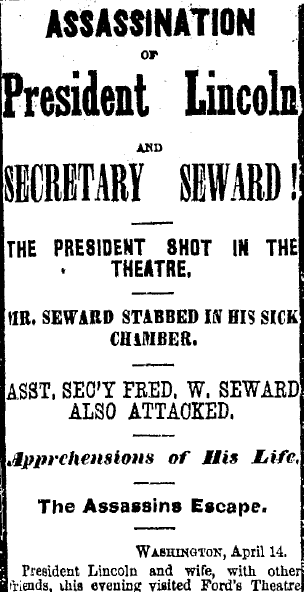
This Maine newspaper uses similar headlines and carries the latest dispatches from Washington regarding Lincoln’s last day alive, the assassination scene, and details of the assassination attempts on Secretary Seward and his son.
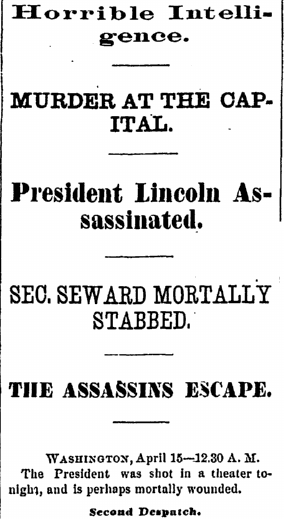
Newspapers in the South reflected the same shock and sadness, as you can see from this Virginia newspaper.
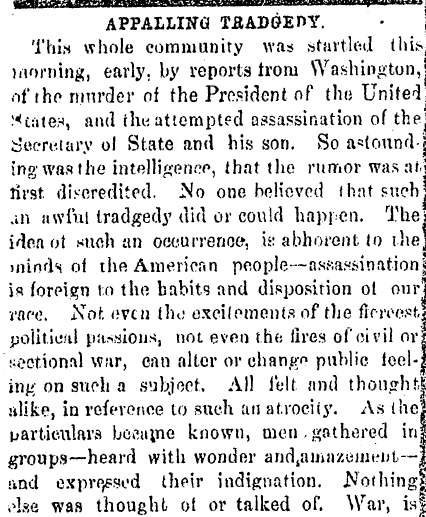
As you can imagine, the news of Lincoln’s assassination riveted the entire nation.
Lincoln’s Funeral Train
Then came the Lincoln funeral train, which passed through 444 communities in 7 states; many Americans went to see the train carrying the body of the President (and that of his young son, Willie) from Washington, D.C., to Springfield, Illinois, to pay their final respects. After departing from Washington, D.C., Lincoln’s funeral train passed through Maryland, Pennsylvania, New Jersey, New York, Ohio, Indiana, and finally Illinois.
This Vermont newspaper article outlines the plans for the funeral train.
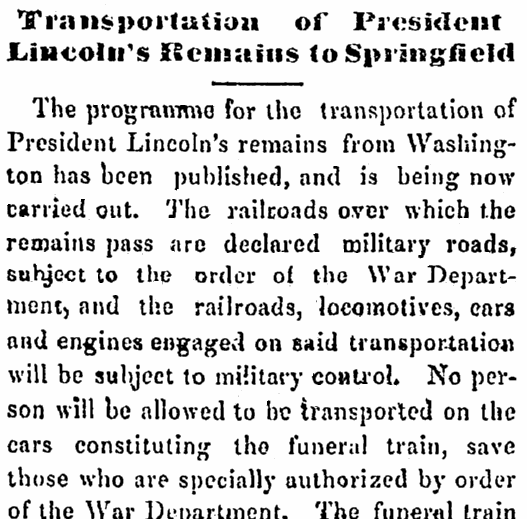
My Ancestors Watched as Lincoln’s Train Passed
At this time in our nation’s history, most of my ancestors who had immigrated to the United States were living in Cleveland, Ohio, and many of them may have seen the following newspaper article. With incredible detail, this article explains not only the order of the reception of the funeral train in Cleveland, but also the exact times the pilot engine (an advance train engine checking the tracks, etc.) and the cortege train would leave each of the 19 stations in the Cleveland area. It also instructs that every business be closed that day, flags were to be at half-mast, and “the bells of the city will be tolled during the moving of the procession.”
I clearly remember my grandmother relating stories to me of her parents and aunts and uncles all going to see Lincoln’s funeral train that day.
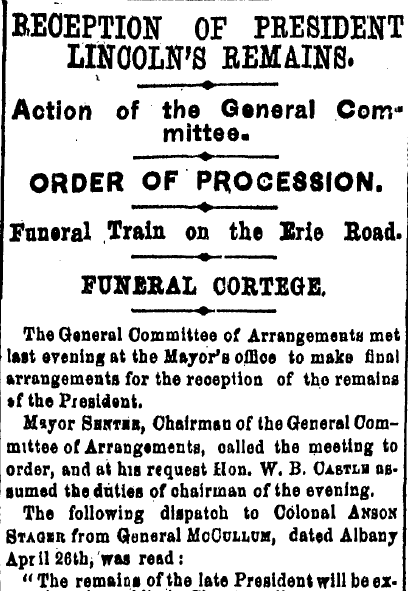
This article from a New York newspaper provides many details about the movements and stops of Lincoln’s funeral train.
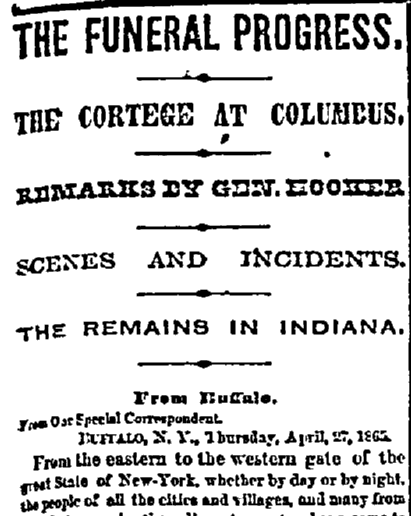
More Interesting Facts about Lincoln
In my reading on Lincoln’s assassination I found two particularly interesting facts that I need to research more. The first is that the President’s funeral train actually stopped in the small town of Michigan City, Indiana, adjacent to where I live now.
The second interesting fact is that trains played a prominent role in the life of President Abraham Lincoln even before he was sworn in as president, as explained in this 1861 article from a Pennsylvania newspaper. It reports the story of an assassination plot targeting Lincoln as the president-elect made his way to the nation’s capital to be sworn in. Luckily the plot was uncovered and Lincoln, in disguise, was spirited past the conspirators in Baltimore, Maryland, and—as we all know—was successfully sworn in to become America’s 16th president.
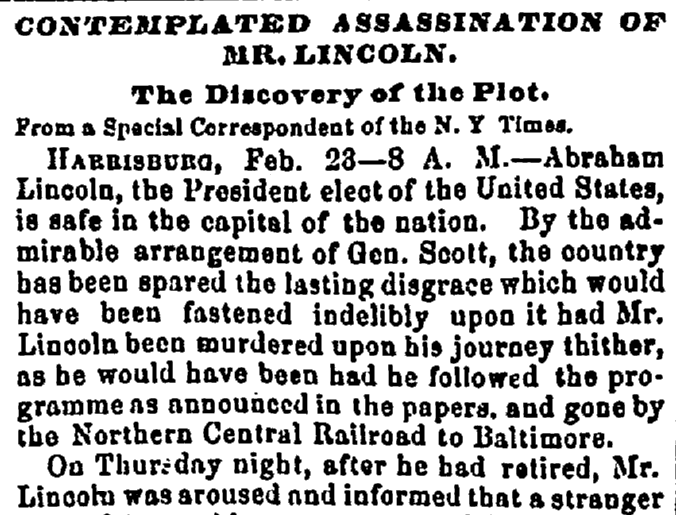
Now, I am betting that is a great story all on its own for a future Blog article! Stay tuned!
Related Articles about Abraham Lincoln:
